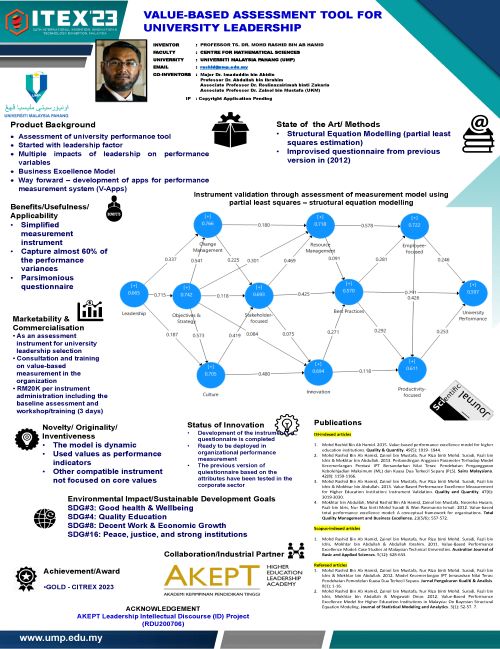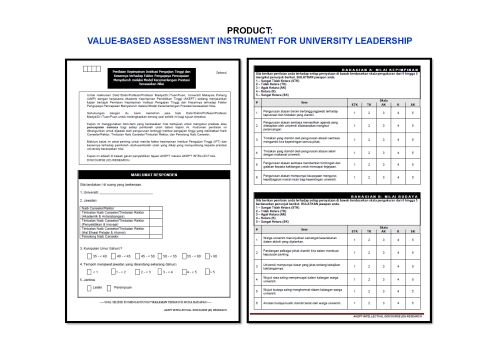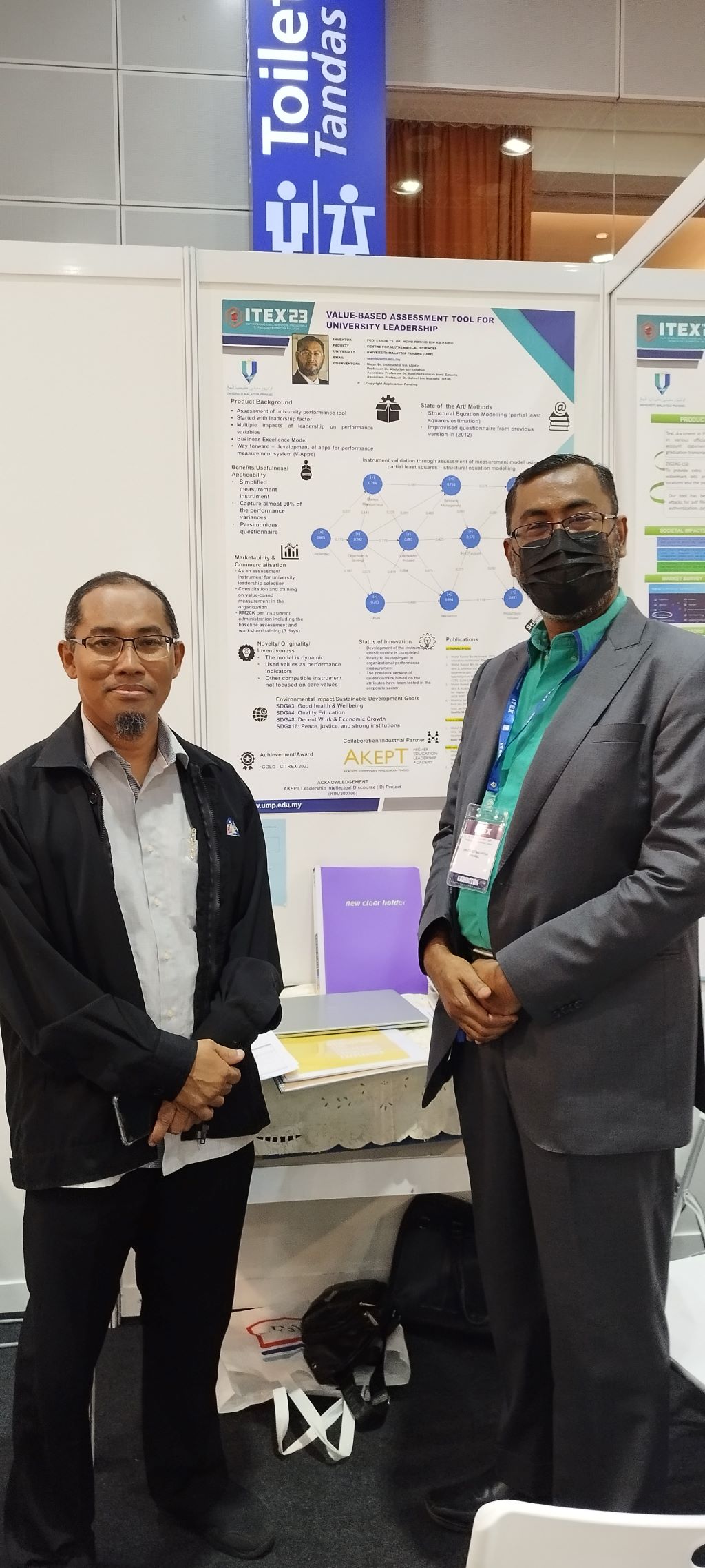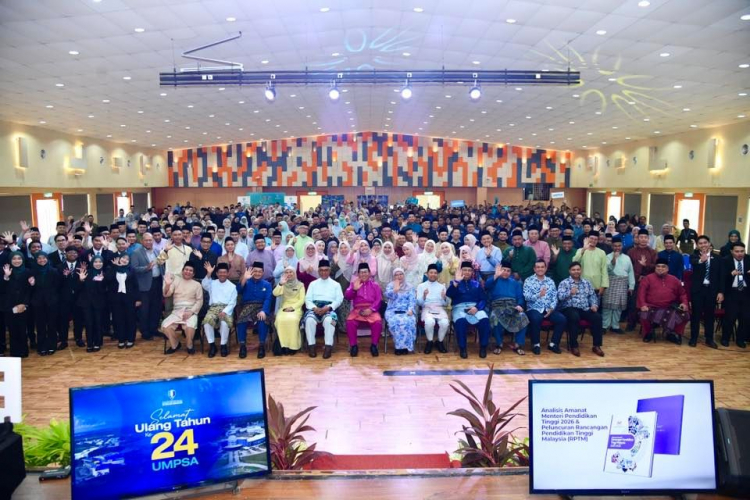Professor Ts. Dr. Mohd Rashid develops leadership assessment instrument using core value indicators
PEKAN, 8 November 2023 – A Professor at the Centre for Mathematical Sciences (PSM), Universiti Malaysia Pahang Al-Sultan Abdullah (UMPSA), Professor Ts. Dr. Mohd Rashid Ab Hamid, 43, has created a leadership assessment instrument using core value indicators.
Recognizing the importance of core values in influencing an individual's identity, which in turn affects the individual's image that will eventually be reflected or translated into leadership practices or styles in managing an organization, inspired him to undertake this research.
This research also received collaboration from Associate Professor of PSM, Associate Professor Dr. Roslinazairimah Zakaria, Senior Lecturer of the Faculty of Industrial Management (FPI) Major Dr. Imaduddin Abidin, and Associate Professor at the Universiti Kebangsaan Malaysia (UKM), Associate Professor Dr. Zainol Mustafa.
According to Professor Ts. Dr. Mohd Rashid, the measurement of mastery or observation of these core values can be integrated into a measurable measurement model to generate organizational excellence.

"In the context of this study, the basic model used is the Value-Based Organizational Excellence Model developed by previous researchers.
"Core values form the basis for the leadership characteristics that should be possessed by a leader, especially in organizations such as universities.
"The instrument built is an improvement to existing instruments that align with current developments to measure the level of mastery of values by university leaders.
"It will have an impact on other factors such as university culture, objectives and strategies, resource management, change management, innovation in the organization, best practices, productivity, employees, and stakeholders, where all these factors will also affect the overall performance of the organization.
"Therefore, the instrument built is very appropriate and important in measuring the level of mastery and practice of leadership based on these core values," he explained.

This research began in 2009, but the items in this questionnaire were refined to ensure the validity and reliability of the instrument created truly measure what is intended and meets the objectives of this instrument.
He added that the product produced is an assessment instrument or, in other words, a questionnaire built based on items obtained through literature reviews and discussions from previous focused group studies.
"The questionnaire that has gone through the content validity and expert validity processes was also tested statistically to ensure that the items used in the study are truly 'strong.'
"When all these initial processes are completed, data will be collected through this instrument, and descriptive or modelling analysis will be carried out based on the research objectives to be achieved.
"This research project received funding from the Academy of Leadership in Higher Education (AKEPT) through the AKEPT Intellectual Discourse (ID) Research grant," he said.
According to him, for the cost involved in training participants or organizations that want training through a Value-Based Excellence Model and exposure sessions to organizational core values and measurement aspects, the actual cost cannot be specified yet because the development of the application is still being planned.
In the future, he plans to develop an application that facilitates respondents to answer the questionnaire given online and at the same time can view statistical analysis easily through the findings provided by the respondents.
"The main goal of the developed instrument is to provide a clear overview of the practice or adherence to aspects of values by a leader or potential university leader.
"It is important in driving the institution, and measurements are also made of other factors affected by leadership such as university culture, objectives and strategies, resource management, change management, innovation in the organization, best practices, productivity, employees, stakeholders, and all these factors will also affect university performance.
"In essence, this instrument can be used as a benchmark for appointing leaders in universities," he said.
He added that if someone is appointed to a position in a university, we can also measure expectations or practices for each factor in the core value-based excellence model, which ultimately impacts the excellence or performance of an institution.
Previously, he won the gold medal for the research 'Value-based Assessment Tool for University Leadership' in the Creative and Innovative Invention Competition (CITREX) 2022 and the research project titled 'Innovation Excellence Framework for Malaysian Higher Education Institutions: A Statistical Modelling Approach' in CITREX 2014.
He also won a silver medal for the research project 'Developing A Core Values Measurement Scale for University Staff: UniCoVa Instrument' in CITREX 2015, the research project 'Structural Equation Modeling (SEM) On Value-Based Performance Excellence Model for Higher Education Institutions (HEIs): A Comparison Between Maximum Likelihood (ML) And Partial Least Squares (PLS) Estimation Technique' in CITREX 2012.
He also received a bronze medal for the research project 'Statistical Validation of Value-Based Performance Excellence Model: A Partial Least Square (PLS) Methodology'5' in CITREX 2011, the research project 'Uni-Cova in CITREX 2016, and the research project 'Value-Based Performance Excellence Model for Malaysian Public Universities: A Structural Equation Modeling (SEM) Approach' in the Islamic Innovation Expo 2011 (i-Inova'11).
In the International Invention, Innovation, and Technology Exhibition (ITEX) 2023 held at the Kuala Lumpur Convention Centre (KLCC) from May 11 to 12, 2023, this research also won a silver medal.
By: Nur Hartini Mohd Hatta, Centre for Corporate Communications
Translation by: Aminatul Nor Mohamed Said, UMPSA Career Centre (UMPSACC)
- 91 views










